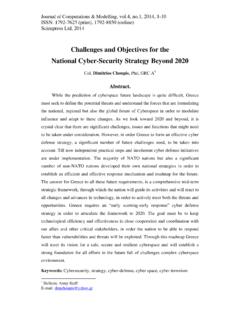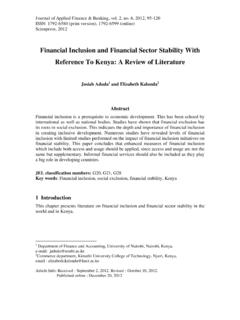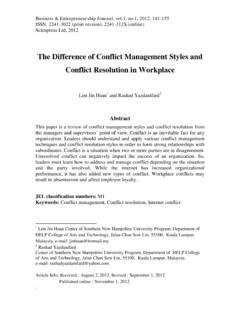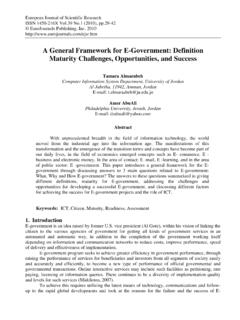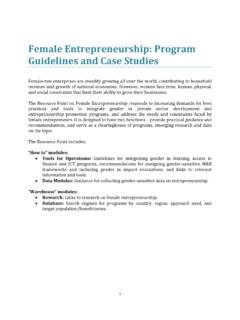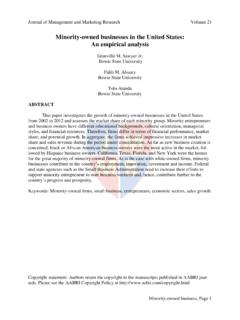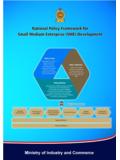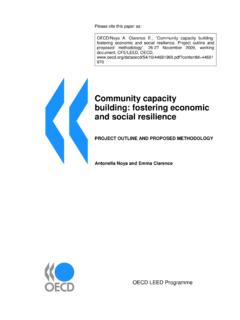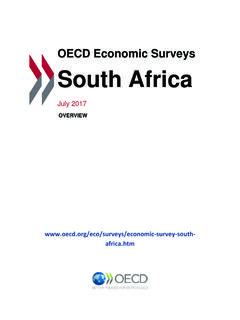Transcription of Women Entrepreneurs: Challenges and Opportunities in …
1 Business & Entrepreneurship Journal, , , 2013, 43-48 ISSN: 2241-3022 (print version), 2241-312X (online) Scienpress Ltd, 2013 Women entrepreneurs : Challenges and Opportunities in the Arab World, UAE Case Zahi K. Yaseen1 Abstract Despite numerous international agreements affirming the rights of Women , a large proportion of Women in the Arab are still more likely to be poor and illiterate compared to men. They usually have less access to elite positions, credit, promotion Opportunities , training and development than men, are far less likely to be active in politics. This situation has can be attributed to society s failure to acknowledge that the roles played by men and Women in the society are not biologically determined but socially constructed, changeable and changing.
2 In most cases, Women play non-economic or less economical roles in the society leading to a state of backwardness. Ironically, Women are vested with the responsibility of household issues, nutrition and childcare. They are also more active in environmental management. JEL classification numbers: M13 Keywords: Gender entrepreneurs , entrepreneurs Challenges and Opportunities , Women entrepreneurs in the Arab World, Business Women in the Arab Middle East. 1 Introduction According to the UN Department of Public Information (1997), there is a need for an integrated approach to development since social, economic, environmental and economic issues are closely interlinked. Such an approach will ensure the empowerment, development and promotion of people instead of marginalizing them, especially Women .
3 1Al Gurair University. e-mail: Article Info: Received : November 26, 2012. Revised: December 10, 2012. Published online : March 9, 2013 44 Zahi K. Yaseen 2 Primary Organizational Benefits in Developing and Promoting Women The three major benefits of developing and promoting Women are enhanced productivity, the attainment of a competitive advantage and enhanced financial performance. One of the best ways of promoting and developing Women is increasing their access to credit, property ownership and education, especially higher education. With education, these Women are more likely to access quality employment and earn good salaries for taking care of their homes.
4 They will also have something extra that will be used as capital for initiating enterprises for earning an extra income. The lack of capita has always pushed Women to initiate small enterprises that are less profitable and competitive. However, employment increases their access to credit from the various financial institutions. This can be a source of huge capital for establishing big enterprises. The result is an increased economic advantage. Featuring at the United Arab Emirates (UAE) as an example, majority of the Women entrepreneurs are young and well educated and two-thirds are holders of either a Bachelor s or a Master s degree. Some of them have even acquired special training in business either as vocational training or special business courses. In addition, most of them are running businesses as a part-time activity.
5 Many were employed before starting their businesses and more than 50% have not quit their previous jobs after starting businesses. These have increased the financial performance of Women (Haan, 2004). Evidently, education and access to credit has enabled Women to shift their focus from traditional businesses into more profiting, up-to-date businesses and businesses that utilize advanced information and technologies. Women are generally active and this is evidenced by their representation in all sectors. This indicates that they make significant contributions in economic production. However, their level of production is lower than expected due to the various cultural, economic, political, and social barriers they face. This means that if the various government institutions and the society would promote and develop Women , it will increase their economic production.
6 3 Challenges Women face a lot of Challenges in their efforts to develop and which make it trickier for them to start up businesses. The first challenge is male prejudice, stereotyping and preconceptions. Although the roles of Women have dramatically changed in the society, Women are still perceived less suitable for some types of jobs like managerial positions and establishing businesses. Some of the stereotypes, prejudices and preconceptions applied to female managers apply to Women entrepreneurs or aspiring entrepreneurs . Some of these claims assert that Women are less confident, analytical, emotionally stable, aggressive, and consistent and have poorer leadership abilities compared to their male counterparts. Women are also believed to work to supplement family income and thus they are less motivated to drive a business to success (Owen and Todor, 1993).
7 Generally, these negative stereotypical misconceptions and prejudices form the basis of not motivating Women to venture into business or giving them he support establish businesses. Hagan et al (1990) point out that a significant percentage of Women entrepreneurs engage in business as a traditional activity and not as a serious money-making venture. Because Women entrepreneurs : Challenges and Opportunities in the Arab World 45 of this, they lack the motivation to introduce new practices and gather new information meant to boost the performance of their businesses. Entrepreneurial Women have also been found to suffer from home-work conflict. Women are believed to be fit for rearing children and managing homes and, are normally burdened with family responsibilities and household chores (Richardson, 2011).
8 Entrepreneurial Women , therefore, have to strike a balance between shouldering the heavy family-related duties and driving their businesses to success. Hanifa et al (2011) have observed that some entrepreneurial Women are satisfied with being in business and do not experience conflicts between their social, family and leisure lives. However, they face barriers when starting their own business ventures. These barriers mainly come from society and traditions, family and personal reasons, and lack of support. Women for example, have a small leisure gap making it difficult for them to create time for business necessities and measures. They also do little or no feasibility studies and the effect of these is the fear to step out and establish their own businesses. Women entrepreneurs are excluded from business networks both formal and informal networks.
9 A small percentage of Women entrepreneurs in UAE are actively involved in formal networking and many among these own large enterprises. The greater percentage spend a relatively a small amount of time discussing their business venture mainly with family and friends (Haan, 2004). Because of this, they miss Opportunities for training on various important business skills, making joint presentations and, accessing new and larger markets. Women are faced with organizational barriers for example inflexible working rules. Some of the work structures do not encourage the retention of Women in case they go for maternity leave. Neither do they encourage the recruitment of female employees. Once they lose their jobs, these Women lose their chances to acquire entrepreneurial knowledge and the capital they need to start their own businesses.
10 The competitive nature of business environment calls for higher standards of performance and effort in businesses. However, the family and social Challenges faced by Women and their limited knowledge on business make it difficult for Women to deliver this level of performance. This makes their businesses to be generally low-profiting and less competitive (Kyro, 2001). The corporate culture of the UAE is not hospitable to Women entrepreneurs and this is worsened by the promotional strategies used. Bruni et al. (2005) explain that most of the businesses are managed and by owned men who have formed strong supportive networks and alliances. The promotion decisions used are gender-based. These have limited the progress of Women to the top management of companies and thus the experience they need to run large personal enterprises.
